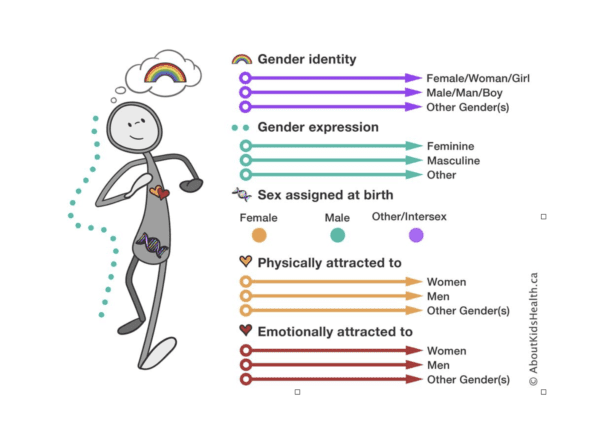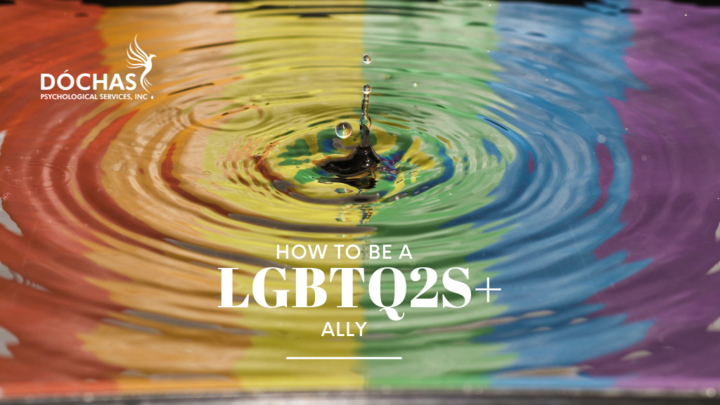This blog has been updated! Please scroll down for details.
Hey everyone, Schareen here. June is pride month! This month provides us with an opportunity to learn about the history, culture, challenges, and fabulousness that is 2SLGBTQIA+ life. So I thought I would take an opportunity to open the discussion about some of the best ways to support our 2SLGBTQIA+ brothers, sisters, and everything in between.
Now, I do not claim to be an expert here. I need to be respectful and say that as a heteronormative individual, I do not claim to fully understand everything a 2SLGBTQIA+ individual faces or experiences, which is why this list is not exhaustive and only represents what I have been told and learned from the LGBTQ2S+ individuals in my life. So with that out of the way let’s talk about the most helpful, and not-so-helpful, ways to support.
No surprise here! Learning more about the 2SLGBTQIA+ world can be helpful in a number of ways. Learning about terminology, the importance of Pronouns, and the challenges facing the 2SLGBTQIA+ populations can reduce confusion, and prejudice, and ensure that we are approaching others from a position of respect and understanding. You don’t have to become an expert. Just taking the time to read an article, watch a documentary, or even just ask questions to help you better understand, can make a world of difference.
Understanding the differences between gender and sexual orientation = helpful
This can be a confusing one (even for those just starting to explore their identities). Often sexual orientation is lumped in with gender and this is not the case. Gender refers to the sex you identify with, i.e. male, female, or non-binary. Sexual orientation refers to who we are attracted to.
One of the most common frustrations I hear from non-binary and trans individuals is that following transitioning or coming out as non-binary, people assume they are gay or lesbian. This would only be the case if the individual is attracted to the same sex they identify with.
Privacy = helpful
Do you know what’s strange? How many people become really interested in who’s doing what to who in the bedroom when someone is 2SLGBTQIA+. 2SLGBTQIA+ individuals often get asked questions like “So, who’s on top? Or are you the pitcher or catcher?!”. Not only are those kinds of questions not helpful, but they are incredibly intrusive! Most people (not just
LGBTQ2S+ individuals) don’t want to answer such specific questions about their sex life. So let’s just let people have their privacy.
Patience = helpful
In order to effectively navigate this topic, it is important for both sides to exercise patience. For example, you might never have had the chance to openly explore your sexuality or may be unfamiliar with some of the evolving language in this area. Alternatively, you might have recently come out to your family, revealing your sexual orientation or sharing your new name and pronouns, which their family members may be finding difficult to grasp. It is in these situations that patience becomes essential for everyone involved.
While 2SLGBTQIA+ individuals have always existed, for many years they were forced to live behind a mask of heteronormative presentation. This makes it feel like this stuff is new, and new can be confusing and scary. It can take time for people to become “okay” with what they believe is a huge change. It is just important to remember at the end of the day the individual as a person has not changed. Who they fundamentally are is not changed by the presentation of their genitals or who they are attracted to.
Attending events/places where everyone can feel comfortable = helpful
It is important to consider if where you’re going is 2SLGBTQIA+ friendly. Despite its being 2023 believe it or not, some places still are not inclusive. So, when planning events consider if where you are going will feel comfortable for everyone involved. Alternatively, your 2SLGBTQIA+ friend may need support in going somewhere for the first time. You may be able to provide the support needed to bridge the gap and help them expand their social circle by going somewhere new, like a club or show.
 Resources to help support the 2SLGBTQIA+ community.
Resources to help support the 2SLGBTQIA+ community.
There usually is a Gender and Sexuality Alliance (GSA) at most high schools, which can be a major support for youth.
Facebook has several support groups for 2SLGBTQIA+ individuals, from queer parents to individuals supporting their children.
Instagram has many positive influencers. Here are a few:
These two are links to Alberta networks and businesses that are pro-2SLGBTQIA+:
Here are some additional resources if you’re in the Edmonton area.
- Edmonton Men’s Health Collective (specific for gay/queer men)
- Spruce Grove GSA
- The Wellness Centre (has links to many other organizations)
- CHEW Project YEG
- The Landing UofA
- QTHC
- Camp fYrefly
- Out-Loud St. Albert
Common acronyms used within the Government of Canada – 2SLGBTQI+ terminology – Glossary and common acronyms – Women and Gender Equality Canada
More resources can be found on the Pride Centre’s resource page.
You can reach out to us at Dóchas by emailing info@dochaspsych.com or calling us at 780 446 0300.
About Dóchas Psychological
Dóchas Psychological Services is a well-established and trusted therapy clinic located in Spruce Grove, Alberta. At Dóchas we value the idea that everyone deserves a safe space. Through connection and education, our team works hard to build a trustworthy relationship with each of our clients. It is our goal to create a community for our clients to feel like they belong.
Update
Hey everyone, Schareen and Kim here.
Recently I (Schareen) wrote a blog about supporting the 2SLGBTQIA+ community, and this piece is a follow-up to that. As mentioned in the previous blog I am no expert, and I am grateful to have had some feedback provided that has allowed me to further my knowledge about ways to support this community. So in the interest of learning and support, I wanted to correct some of the previous article to reflect what I have recently learned.
1 – The acronym has been updated to 2SLGBTQIA+. This acknowledges that 2 spirit indigenous peoples were here on Turtle Island before others. Indigenous individuals still face many challenges in having their history recognized within Canada. 2S individuals may face even greater challenges in having their identity questioned and/or challenged by society. As such, I am grateful to have had this correction to the acronym brought to my attention. This update allows us to become aware of and hopefully reduce the internalized prejudices we may unknowingly uphold.
2 – Understanding the differences between gender and sexual orientation
As mentioned, this one is a confusing one so let me clarify further. In the previous blog I discussed this point very briefly and only talked about gender and sexual orientation. I think I may not have given this area as much attention as it deserves to actually be considered helpful. So, let’s break it down:
Sex – refers to male, female, or intersex. This deals with primary and secondary biological characteristics. Primary biological characteristics are those we come out of the womb with (we’re born with them). Those that are secondary show up as we hit puberty, you know, like all that lovely hair…
Gender – refers to the characteristics of women, men, girls, and boys that are socially constructed. This refers both to how an individual interprets their own gender (gender identity), as well as how they wish to be perceived by the larger society (gender expression). This includes norms, behaviours and roles associated with being a woman, man, girl or boy, as well as relationships with each other. As a social construct, gender varies from society to society and can change over time.
I (Kim) needed to have this clarified a bit further, so here’s my understanding of it… gender identity is how we figure out our gender in relation to society, like cis-male or non-binary. So I interpret it like how I am comparing myself to others. For example, I would be cis-female, whereas one of my family members would be a lesbian. But gender expression is how we show our gender identity to the world through clothing, hairstyle etc. So, using myself as an example, as a cis-female, I choose a more feminine hairstyle, wear dresses and perfume, etc.
Sexual orientation – refers to the people you have romantic and/or sexual feelings for. This can be someone of the opposite sex or gender, someone of the same sex or gender, or all sexes or genders. It is a physical and emotional attraction.
The main takeaway I had hoped to communicate previously, was that an individual’s sex and gender is not what classifies their sexual orientation. Below we have included an image that can help to explain this a little more.
 3- GSA is now defined as “Gender and Sexuality Alliance” to be more inclusive, rather than the previously used “Gay-Straight Alliance”. These alliances are now also available for a wider range of ages, not just high school.
3- GSA is now defined as “Gender and Sexuality Alliance” to be more inclusive, rather than the previously used “Gay-Straight Alliance”. These alliances are now also available for a wider range of ages, not just high school.
4 – When Schareen spoke about the common frustration she hears from non-binary and trans people, we’d like to clarify (as pointed out by one of our clients) it’s best to ensure we are actively listening to people and try out best to understand rather than make assumptions. We believe this is true for most life situations. In addition, as one of our clients stated, “When we work towards seeing and accepting who people are on a fundamental level (rather than biological or based on attraction), we can positively impact the mental health of those around us who do not fit within the cisnormative or heteronormative lived experiences”. Again, we believe this to be true beyond this discussion.
5 – We have also had a chance to correct and update some of the resources. If you need more information about 2SLGBTQIA+, please reach out to any of them.
Thank you to all who wrote in. The feedback enables us to ensure all feel heard, seen, and valued. We appreciate you!
Disclaimer
Information provided through Dóchas Psychological Services blogs or vlogs is meant for educational purposes only. They are NOT medical or mental health advice. You can read more about our disclaimer here.











